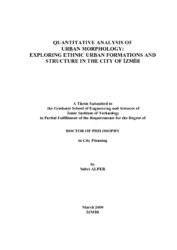Please use this identifier to cite or link to this item:
https://hdl.handle.net/11147/3007Full metadata record
| DC Field | Value | Language |
|---|---|---|
| dc.contributor.advisor | Arkon, Cemal | - |
| dc.contributor.author | Alper, Sabri | - |
| dc.date.accessioned | 2014-07-22T13:48:45Z | - |
| dc.date.available | 2014-07-22T13:48:45Z | - |
| dc.date.issued | 2009 | - |
| dc.identifier.uri | http://hdl.handle.net/11147/3007 | - |
| dc.description | Thesis (Doctoral)--Izmir Institute of Technology, City and Regional Planning, Izmir, 2009 | en_US |
| dc.description | Includes bibliographical references (leaves: 128-150) | en_US |
| dc.description | Text in English; Abstract: Turkish and English | en_US |
| dc.description | xii, 381 leaves | en_US |
| dc.description.abstract | Urban design and planning have been mainly involved in forming and structuring our cities. In order to understand this form and structure, various methods and tools of analyses have been developed in urban morphology. Spatial analysis is of basic need within planning and one of the essential tools for anyone who wants to investigate space. Spatial analyses are also useful tools on the way to a deeper understanding of the city itself. The aim of this thesis is to develop a theoretical framework and quantitative methodology for modeling urban form and structure, in order to better understand the complexity inherent in urban environments and to generate and improve relevant knowledge for urban design and planning. Space syntax is a set of techniques for the analysis of spatial configurations of all kinds, especially where spatial configuration seems to be a significant aspect of human affairs, as it is in buildings and cities. Space Syntax is unique as an analysis tool since it allows us to objectively measure the street network configuration. To explore the geometrical features of urban form, a geometric model is utilized and a typological analysis approach will be used for the basic element of the fabric: .the building block., Quantitative measures obtained from these syntactic and geometric approaches, their relationships and interdependencies are analyzed and explored. An integrated set of measures is identified. Case studies in Izmir are selected for testing the methodology to be developed. Methodology development is concentrated on five ethnic districts at the late-Ottoman period. These are also known as the Greek, Jewish, Armenian, European and Turkish quarters of the city. By analyzing the urban form and structure of these districts, a new integrated quantitative methodology for analysis of urban morphology is presented. Keywords: Urban Morphology, Urban Analysis, Space Syntax, Urban Pattern, Izmir | en_US |
| dc.language.iso | en | en_US |
| dc.publisher | Izmir Institute of Technology | en_US |
| dc.rights | info:eu-repo/semantics/openAccess | en_US |
| dc.subject.lcc | HT169.T9 .A47 2009 | en |
| dc.subject.lcsh | City planning--Turkey--Izmir | en |
| dc.subject.lcsh | Quantitative research | en |
| dc.subject.lcsh | Ethnic groups | en |
| dc.title | Quantitative Analysis of Urban Morphology: Exploring Ethnic Urban Formations and Structure in the City of Izmir | en_US |
| dc.type | Doctoral Thesis | en_US |
| dc.institutionauthor | Alper, Sabri | - |
| dc.department | Thesis (Doctoral)--İzmir Institute of Technology, City and Regional Planning | en_US |
| dc.relation.publicationcategory | Tez | en_US |
| dc.identifier.wosquality | N/A | - |
| dc.identifier.scopusquality | N/A | - |
| item.openairecristype | http://purl.org/coar/resource_type/c_18cf | - |
| item.languageiso639-1 | en | - |
| item.openairetype | Doctoral Thesis | - |
| item.grantfulltext | open | - |
| item.fulltext | With Fulltext | - |
| item.cerifentitytype | Publications | - |
| Appears in Collections: | Phd Degree / Doktora | |
Files in This Item:
| File | Description | Size | Format | |
|---|---|---|---|---|
| T000218.pdf | DoctoralThesis | 53.96 MB | Adobe PDF |  View/Open |
CORE Recommender
Page view(s)
252
checked on Mar 31, 2025
Download(s)
902
checked on Mar 31, 2025
Google ScholarTM
Check
Items in GCRIS Repository are protected by copyright, with all rights reserved, unless otherwise indicated.